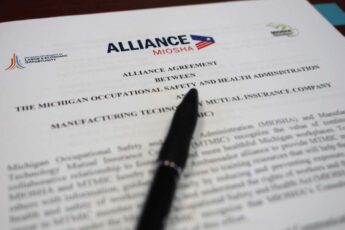By Megan Brown ARM, CWCP, CAWC
President
Due to recent pending legislative changes, I thought that it would be beneficial to provide the history of workers’ compensation as well as where we are today.
Workers’ Compensation is a state-mandated insurance program that provides wage replacement, medical treatment, and rehabilitation benefits to employees who are injured while performing their job duties.
Prior to 1912 injured workers in Michigan had to file civil (tort) lawsuits against their employers to receive compen-sation. This process required employees to prove that the injury resulted from employer negligence. Employers, in turn, had three defenses to use such as employee negligence, the employee knew the associated dangers of doing the work and assumed the risk or that another employee’s negligence caused the injury. If the employee won the tort action, damages were awarded by a jury.
In 1912, Michigan adopted a Workers’ Compensation Act establishing a “no-fault” system commonly referred to as the Grand Bargain, under which the worker gave up the right to sue their employer for workplace injuries in return for receiving defined benefits such as wage loss compensation, medical expense coverage and rehabilitation services regardless of who was at fault.
Over the years the Michigan Workers’ Compensation system has evolved, and new legislative proposals are currently under consideration. Two key bills—Senate Bills 74 and 75—propose significant changes, including:
- Increasing the average weekly wage calculation,
- Reducing employer authority over medical treatment decisions from 28 days to 14 days,
- Reforming rules around in-dependent medical examinations (IMEs).
These proposals would significantly alter the current Grand Bargain by also allowing injured workers to both sue their employer and collect workers’ compensation benefits. This dual-path option would erode the foundational agreement that has balanced employer and employee rights for over a century.
These bills, supported by trial attorneys, are currently being reviewed by the Senate Labor Committee. We are actively monitoring their progress and assessing potential impacts on our policyholders.
For further information on workforce and employment-related issues, I encourage you to reach out to the Michigan Manufacturers Association (MMA) who are a valuable resource for navigating changes in employment law and workers’ compensation policy.






